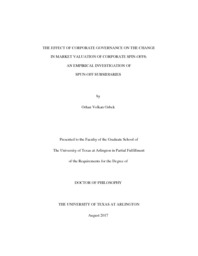
ATTENTION: The works hosted here are being migrated to a new repository that will consolidate resources, improve discoverability, and better show UTA's research impact on the global community. We will update authors as the migration progresses. Please see MavMatrix for more information.
Show simple item record
| dc.contributor.advisor | Quick, James | |
| dc.creator | Ozbek, Orhan Volkan | |
| dc.date.accessioned | 2023-09-11T14:50:19Z | |
| dc.date.available | 2023-09-11T14:50:19Z | |
| dc.date.created | 2017-12 | |
| dc.date.submitted | December 2017 | |
| dc.identifier.uri | http://hdl.handle.net/10106/31667 | |
| dc.description.abstract | This dissertation focuses on the change in market valuation of spun-off subsidiaries two years after the corporate spin-off. A review of the literature indicates that the research pertaining to determinants of the market valuation following corporate spin-offs from the perspective of spun-off subsidiaries has been limited. While the extensive corporate governance literature indicates that different governance structures of the firm have diverse implications on the choice of firm strategies and associated performance, our knowledge of how these governance elements might impact the change in market valuation of spun-off subsidiaries is virtually nonexistent. Grounded in agency, resource dependence, and upper echelons theories, this research examines how board characteristics, CEO characteristics, and ownership structures impact the change in market valuation of the spun-off subsidiary (child firm), which is assessed by the change in market value of equity within two years following the corporate separation of the child from its divesting (parent) firm.
The study is based on 138 completed corporate spin-offs undertaken in the U.S. between 2000 and 2014, identified using the SDC Platinum database. My results indicate that the board size and CEO duality have significant positive effects on the change in market valuation of the child firm whereas the CEO age and managerial ownership have significant negative effects on this relationship. On the other side, the board average age, CEO origin, board independence, institutional ownership, and board members’ and CEOs’ external directorships do not show any significant effects on the change in market valuation of the child firm.
Regarding research contributions, this study is grounded in three established theories —agency, resource dependence, and upper echelons — to explain an important phenomenon of the change in market valuation of the child firm following the spin-off. Secondly, the study demonstrates critical effects of the corporate governance structure, including board and CEO characteristics as well as ownership structures on the change in post-spin-off market valuation from the perspective of the child firm. Thirdly, the study uses the market value of equity to assess the market valuation, which provides important cues regarding investor perceptions of the child firm’s business prospects.
Concerning managerial implications, this study indicates that larger boards, younger CEOs, and the CEO and chairman of the board being the same person all help to improve the child firm’s market valuation. On the opposite side, a large number of shares owned by managers will negatively affect the market valuation of the child firm. These results can be considered critical key points for establishing an effective governance structure at the child firm. | |
| dc.format.mimetype | application/pdf | |
| dc.language.iso | en_US | |
| dc.subject | corporate spin-offs | |
| dc.subject | market valuation | |
| dc.subject | spun-off subsidiaries | |
| dc.subject | corporate governance | |
| dc.subject | board characteristics | |
| dc.subject | CEO characteristics | |
| dc.subject | ownership structures | |
| dc.title | THE EFFECT OF CORPORATE GOVERNANCE ON THE CHANGE IN MARKET VALUATION OF CORPORATE SPIN-OFFS: AN EMPIRICAL INVESTIGATION OF SPUN-OFF SUBSIDIARIES | |
| dc.type | Thesis | |
| dc.date.updated | 2023-09-11T14:50:19Z | |
| thesis.degree.department | Management | |
| thesis.degree.grantor | The University of Texas at Arlington | |
| thesis.degree.level | Doctoral | |
| thesis.degree.name | Doctor of Philosophy in Management | |
| dc.type.material | text | |
Files in this item
- Name:
- OZBEK-DISSERTATION-2017.pdf
- Size:
- 1.214Mb
- Format:
- PDF
This item appears in the following Collection(s)
Show simple item record


